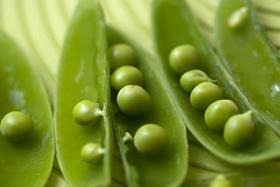
Peas could be a more environmentally friendly way of making gin according to new research.
Led by James Hutton Institute agroecolgoist, Dr Pietro Iannetta, the project “Transition paths to sustainable legume based systems in Europe: TRUE”, has explored using peas to create one of Britain’s favourite spirits.
Their research suggests that the environmental footprint of pea gin was significantly lower than for wheat gin across 12 of 14 environmental impacts, from climate change to water and air pollution.
“In real tangible terms of climate change impact, sipping two units of gin is similar to consuming a small serving (150 ml) of milk, or to driving one km in a petrol car,” explains Theophile Lienhardt, lead author of the study.
In response, Scotland’s Arbikie Distillery has experimented with using the kernels of dried, de-hulled peas, which are milled and fermented in place of mashed wheat grain.
Kirsty Black, manager of the Arbikie Distillery, said: “Following two distillations to produce a neutral base spirit, botanicals including juniper and coriander can be used to produce a final gin that retains the same sumptuous, aromatic flavour as gin made from cereal grain spirit.”
The process of gin making has many steps, beginning with the cultivation of wheat, including all the agricultural inputs, and then the harvesting and transportation. This is followed by the fermentation and distillation process, which includes milling, enzyme addition and heating.
Finally the gin is bottle and packed for distribution. The greenhouse gases produced during this process was calculated to be 2.3kg CO2equivalent per 70cl bottle of gin, around 0.16kg CO2equivalent per large measure.
Dr Iannetta noted:“We found that the environmental footprint of pea gin was significantly lower than for wheat gin across 12 of 14 environmental impacts evaluated, from climate change, through water and air pollution, to fossil energy consumption.”
Professor Mike Williams from Trinity College Dublin, adds: “Peas fix nitrogen from the atmosphere, and therefore don’t require applications of polluting synthetic nitrogen fertilisers. Furthermore, pea hulls and distillery co-products provide protein-rich animal feeds that can replace soybean imported from Latin America, where soybean cultivation is driving deforestation”.



